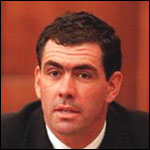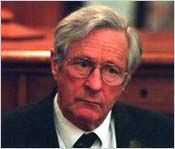The King Commission's innings is coming to a rather abrupt end. But the row looks likely to intensify -- with allegations that this smacks of a cover-up bound to echo from various parts of the cricketing world, and from many South Africans.
Let's begin with what the Commissioner actually said: "Current evidence does not suggest there are any other avenues of enquiry. It hasn't been a witch-hunt. It would be a witch-hunt if we continued to question people without an evidentiary basis. The Commission has achieved its objective."
He claimed that his Commission had stimulated the world-wide investigation and this "really achieved what we set out to do".

The main explanation given by King, though, was a ludicrous claim that he may not legally be empowered to chair the Commission. That 'worry' stems from a Constitutional Court decision in another matter which bears very little relation with King's own position. Yet, he persisted in using this supposed danger as a cue for bowing out: "There is this threat of the constitutionality of my chairmanship of the committee... which one cannot ignore."
He added, significantly: "These recent incidents have precipitated what I had been thinking about for a while."
He also raised the interesting argument that to continue hearings would "occasion expense and time". This after he unnecessarily fought and lost two court cases paid for by the tax-payers.
Live Africa Network News won a High Court action forcing the judge to allow radio broadcasting, and the judge then also accepted the presence of television cameras.
Then King was so sure he needed to get the hearings going again (yes, get them going again!) that he fought a court battle against Cronje's lawyers last month in a failed attempt to start up again within days. He was then due to begin the new hearings this week (Monday, February 19).
Now, two crucial witnesses will not be recalled. They are: Dr Ali Bacher, the key cricket administrator who controlled the fate of South African cricket for decades. The key recalled witness was to be Cronje himself.
Senior cricket sources have been saying for some time that both they and the government want the whole issue of cricket corruption by South Africans to "peter out". But few expected King would be so blatant about it.
As reported by rediff.com earlier this week, there are distinct indications that the King Commission's leader-of-evidence Shamila Batohi strongly opposes the winding up of the Commission's hearings at this stage. In fact, she virtually said so in so many words.
However King asserted that Batohi was in agreement with his moves. She could not be reached immediately for her views.
The judge has been in regular contact with the Sports Minister Ncgonde Balfour, whose ministry has paid the costs of the commission. On Thursday, he said: "I accept what the judge has given me. I cannot for the life of me say to the judge: 'do not close it'. The judge has written to the President's office and we will wait till he puts in the report to the president."
Dr Bacher was not even trying to hide his relief. He said: "I am very very happy. It is now apparent that whatever came out of the inquiry... that is it. There has been no new information that might indicate that any other cricketer may have been involved."

The move by King leaves it open to him to conclude that Cronje has not told the full truth. If so then the conditional agreement to allow him immunity from criminal prosecution will be declared null and void. But I can already see that if the judge now does rule against Cronje, he will also have given Cronje's lawyers a perfect loophole. They will argue that King deprived them of the right to have their client recalled to the witness stand ... and in that recall he may well have told more of -- or all of -- the truth.
It must be remembered that Cronje's own spiritual guide, Rev. Ray McCauley, told a magazine that Cronje had "not yet been asked all the right questions". He had told the truth in respect only of what he had actually been asked.
And in the case of Herschelle Gibbs, who is now back in Test cricket, there are still some interesting questions that could have emerged from a more detailed transcript of all the cell-phone conversations.
And then there are some other matches where a finger of suspicion could be pointed.
Above all, so little has emerged as to what the cricket authorities in South Africa really knew -- and if they didn't, why were they so blind, or deaf?
All in all, it is very expedient for the authorities that this investigation ends -- in the words of the poet T S Eliot - "not with a bang but a whimper".
(Paul Martin is editor-in-chief of Sport Africa and Live Africa, and is the regular Southern Africa correspondent for rediff.com)
Related reports:
Court challenge likely to force King Commission to resume
King a pawn in a wider plot?
The match-fixing scandal - the complete story
Mail Cricket Editor